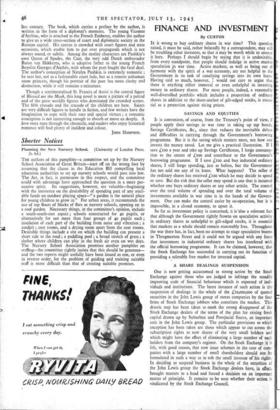FINANCE AND INVESTMENT
By CUSTOS Is it wrong to buy ordinary shares in war time? This question raised, it must be said, rather belatedly by a correspondent, may still be troubling other investors, so that it may be worth while to answer it here. Perhaps I should begin by saying that it is undesirable, from every standpoint, that people should indulge in active .market
speculation war time. Active markets, as well as being out of harmony with the spirit of a war economy, are not helpful to the Government in its task of canalising savings into its own loans. Having said so much, however, would not care to argue that there is anything either immoral or even unhelpful in investing money in ordinary shares. For most people, indeed, a reasonably well-diversified portfolio which includes a proportion of ordinary shares in addition to the sheet-anchor of gilt-edged stocks, is essen- tial as a protection against rising prices.
SAVINGS AND EQUITIES .
It is convenient, of course, from the Treasury's point of view, if people apply their savings in war time in taking up tap bonds, Savings Certificates, &c., since that reduces the inevitable delays and difficulties in carrying through the Government's borrowing programme. But it is the saving which matters most, not how one invests the money saved. Let me give a practical illustration. If I save Doo a year and take up Savings Certificates, I forgo consump- tion to the extent of £roo and contribute to the Government's borrowing programme. If I save Do° and buy industrial ordinary shares, I still forgo spending, just as before, but the Government has not sold me any of its loans. What happens? The seller of the ordinary shares has received Ltoo which he may decide to spend or save. But the risk that the seller may spend is one that is incurred whether one buys ordinary shares or any other article. The control over the total volume of spending and over the total volume of investments available in war time is in the hands of the Govern- ment. One can make the control easier by co-operation, but it is impossible, in a closed economy, to upset it.
So far as investment policy is concerned, it is'also a relevant fact that although the Government rightly frowns on speculative activity in ordinary 'shares as unhelpful to gilt-edged stocks, it is essential that markets as a whole should remain reasonably free. Throughout the war there has, in fact, been no attempt to stage speculative booms in• Throgmorton Street and it could not be argued with any force that investment in industrial ordinary shares has interfered with the official borrowing programme. It can be claimed, however, that the Stock Exchange has succeeded in carrying out its function of providing a tolerably free market for invested capital.
A SHARE DEALINGS SUSPENSION
One is now getting accustomed to strong action by the Stock Exchange against those who are judged to infringe the steadily improving code of financial behaviour which, is expected of indi- viduals and institutions. The latest instance of such action is the suspension of dealings in the whole of the Lro,000,000 of quoted securities in the John Lewis group of stores companies by the four firms of Stock Exchange jobbers who constitute the market. This drastic step has been taken to mark the strong disapproval of the Stock Exchange dealers of the terms of the plan for raising fresh capital drawn up by Suburban and Provincial Stores, an important unit in the John Lewis group. The particular provisions to which exception has been taken are those which appear to cut across the subscription rights to new shares of the very small holders and which might have the effect of eliminating a large number of such holders from the company's register. On the Stock Fxrhange it is felt, with good reason, that new issue schemes in the case of com- panies with a large number of small shareholders should not be formulated in such a way as to rob the small investor of his rights. In deciding to suspend business in the whole of the securities of the John Lewis group the Stock Exchange deakrs have, in effect, brought matters to -a head and forced a decision on an important matter of principle. It remains to be seen whether their -action is vindicated by the Stock Exchange CounciL


























 Previous page
Previous page